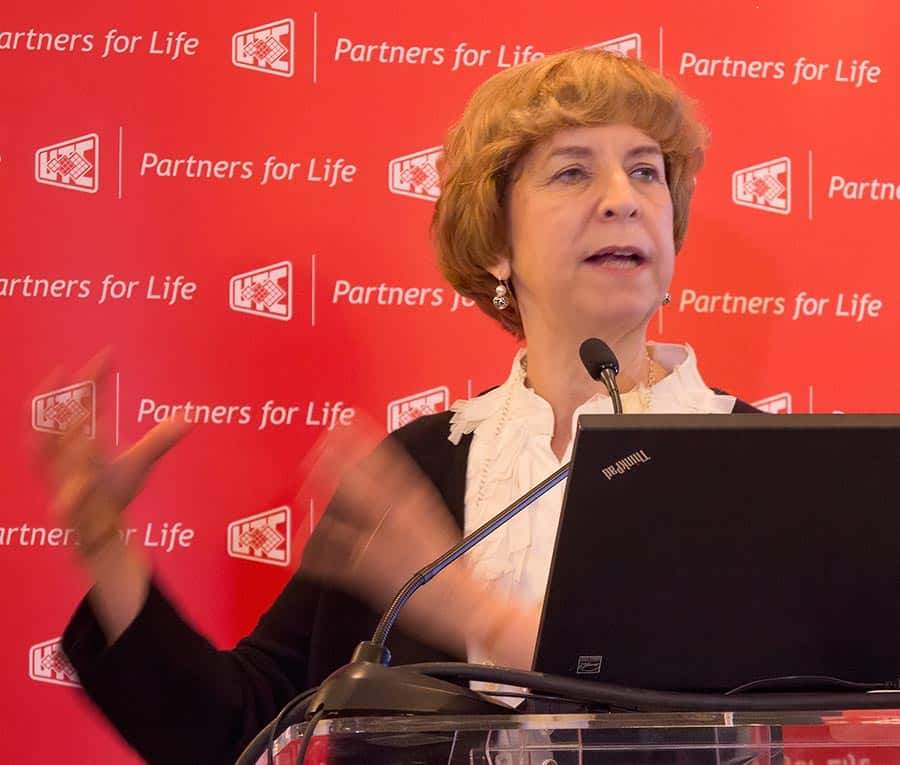
Above: Vivian Schiller, who heads the Civil foundation. Photo by Mark Lyndersay.
BitDepth#1217 for September 03, 2019
A few months ago, TechNewsTT, the online reporting expansion of this column, was accepted into the Civil community of independent newsrooms.
It wasn’t easy to do, requiring more hoop jumping than a group of journalists usually demands to hang out, but it was certainly less than, say, the local chamber of commerce might require as proof of eligibility.
In place of proof of significant profitability, an almost unreachable benchmark for independent journalism in 2019, Civil asks its members to engage with an intimidating system of tokens and blockchain interactions in addition to demonstrating a commitment to producing actual, identifiable journalism.
Civil’s enthusiasm for token and blockchain technology led to early missteps and the first implementation of the project never achieved its goals.
To their credit, the principals rallied and revisited alignment of technology and mission and vastly simplified the process while engaging directly with prospective newsrooms.
The future of journalism doesn’t only belong to monolithic media houses, there is a role for journalists as trusted sources of information.
I found that interview and engagement process to be both valuable in understanding the system that Civil has engineered and in grasping how it might provide value for participants in the longer term.
Once you’ve made it past the requirements for digital gas and Etherium and demonstrate an understanding of what Civil is up to, your journalism project is open to challenge by the community, any of whom can challenge your application and in so doing, your claim to be a trusted journalism resource.
That fulfills part of Civil’s mandate to build trust for online journalism, but it’s also provided an interesting sideshow as websites created to take advantage of the buzz around cryptocurrency have smelled the tokens in Civil’s charter systems and proven terribly keen to get involved.
Most have been unanimously rejected, because the sites don’t even pretend to understand what journalism is.
It’s a start on what Civil hopes to do for journalism, though that roadmap is evolving at a pace that’s faster than traditional media houses have been able to muster, though still slower than the pace of today’s assaults on journalism.
Civil is overseen by a foundation, which is broadly committed to providing grants to support journalism innovation, establishing and demonstrating a commitment to journalism standard and ethics, providing educational programming and building a community among publishers, journalists and their audience.

Members of the registry agree to abide by the Civil Constitution, which sets baseline expectations for journalists operating in the space.
Both are ambitious goals, and the project is being shaped by media entrepreneurs and working journalists. Those are creators who march to a fundamentally different drum than the marketers and managers, the folks we normally hear from when media lamentations begin.
The Civil Foundation is led by Vivian Schiller, a guest speaker on journalism for the TT Unit Trust who spoke both truthfully and positively here about journalism’s future on two occasions.
Civil has dispensed some funds to journalism projects, but its two most notable creations so far are the registry, which lists journalism projects that have passed community review and the newly introduced Boosts, a fundraising mechanism for projects being undertaken by Civil newsrooms.
Boosts haven’t been wildly successful, and that’s likely because most participating newsrooms are just as broke as those looking for funding.
There haven’t been many compelling reasons yet for readers and news consumers to participate in Civil far less support newsgathering ventures in the registry.
What Civil has been addressing, by virtue of its approach, is the rolling collapse of local news. Many of the newsrooms that have joined are quite determinedly local and often ruthlessly specific in their scope and mandate.
Owning the niche and superniche subject matter that’s closest to journalists’ interests will play a significant role in commanding audience in an increasingly fractured news landscape.
Ultimately, all news reporting will be local save for a few supermedia outlets with the budgets to fund bureau outreach and to parachute respondents into newsworthy locations to gather outsider perspective.
What will hasten this reorientation of global newsgathering will be the opposite of what’s happening today, the collapsing of local news coverage and consolidation and compression of news perspective. But that will require the determined hand of journalists, not shills and suits.
When Civil asked me why I’d joined, I explained that I was curious about the project, but I also felt it was a forum in which I could have meaningfully participate.
It’s not something I’ve felt at any of the major media outlets I’ve contributed to, but then, none of them are set up to listen to journalists; not unless they want to talk market strategy and ROI.
The future of journalism doesn’t only belong to monolithic media houses, there is a role for journalists as trusted sources of information and as people engaged in a very public and well scrutinised job that benefits the wider society when it is done well.
My hope is that Civil becomes the rallying voice for not just the practice of journalism, but the development and guidance of journalists as the craft enters a very different phase of its evolution. I’d very much like to be a part of that.

